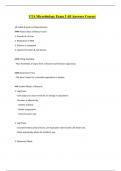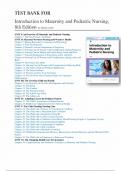Exam (elaborations)
UTA Microbiology Exam 3 All Answers Correct
- Institution
- UTA Microbiology Exam 3 All Answers Correct
UTA Microbiology Exam 3 All Answers Correct Microbial Growth and Reproduction #### 4 Basic Steps of Binary Fission 1. Growth of cell size 2. Replication of DNA 3. Division of cytoplasm 4. Septum formation & cell division #### Z Ring Assembly - FtsZ: Assembles Z ring to form a divisom...
[Show more]




